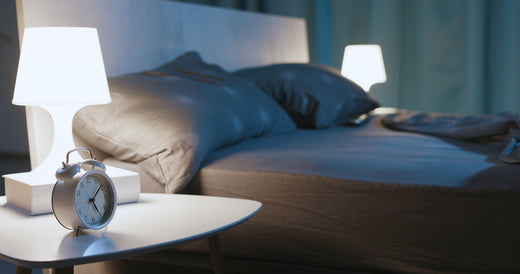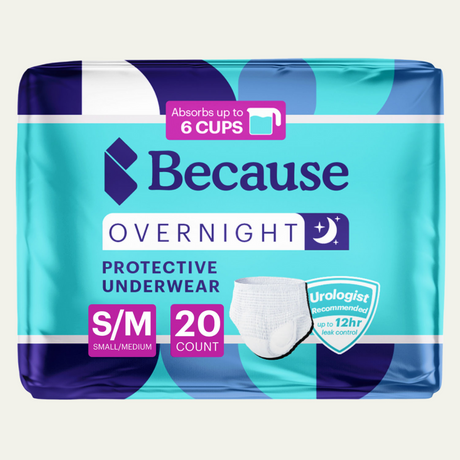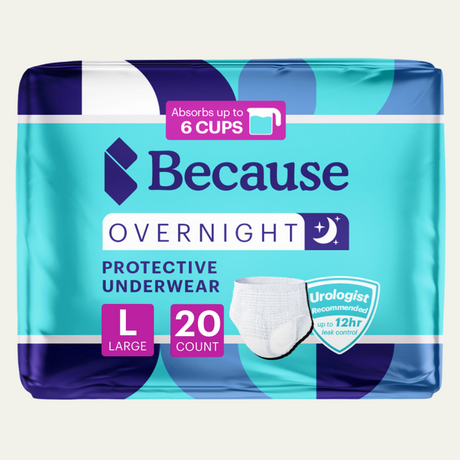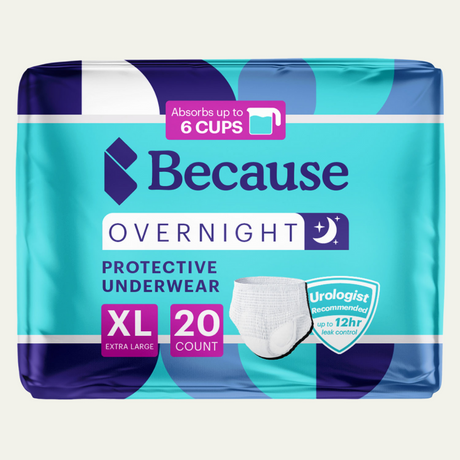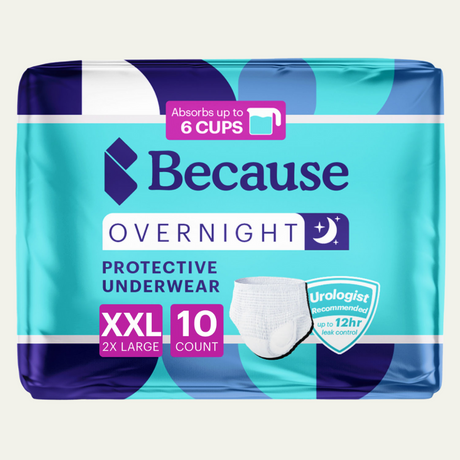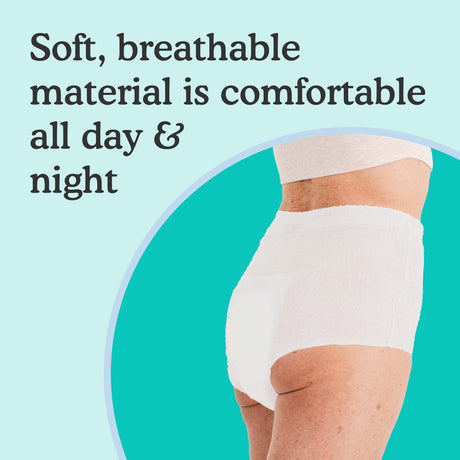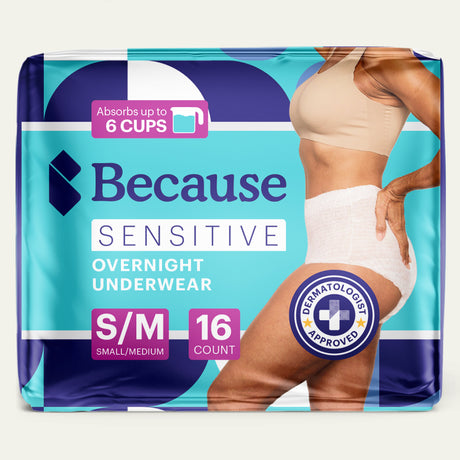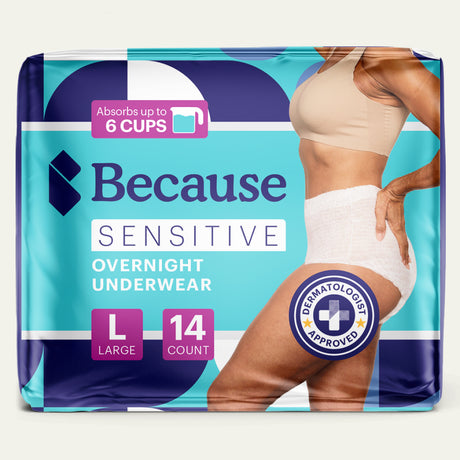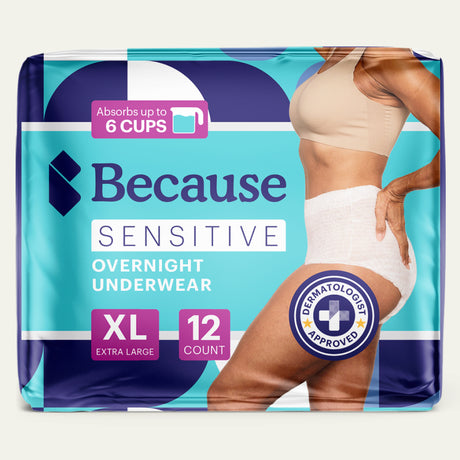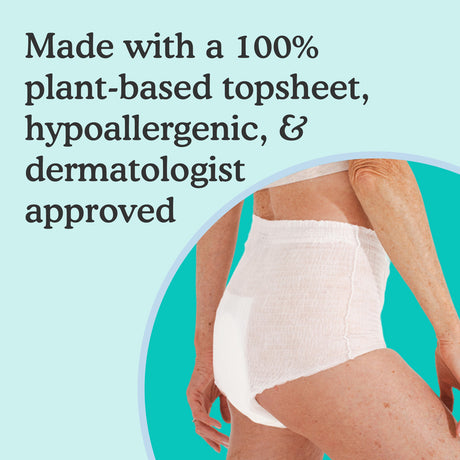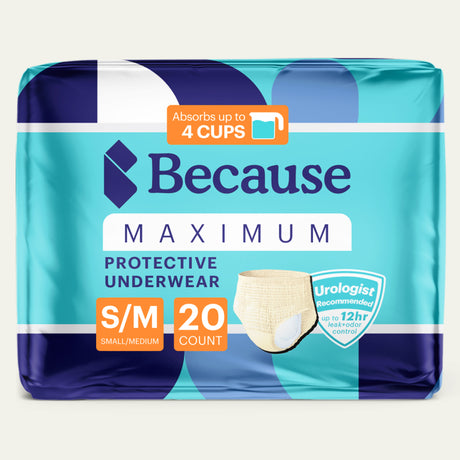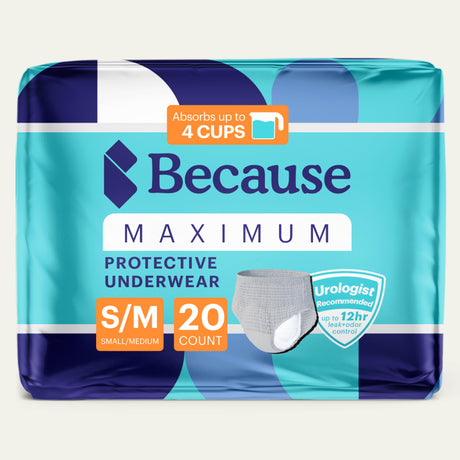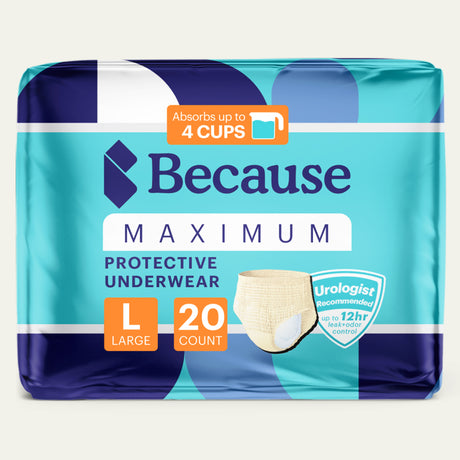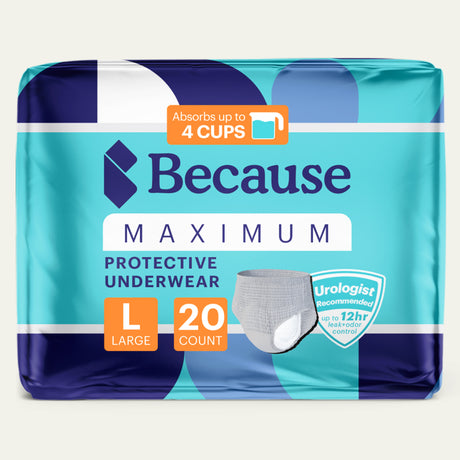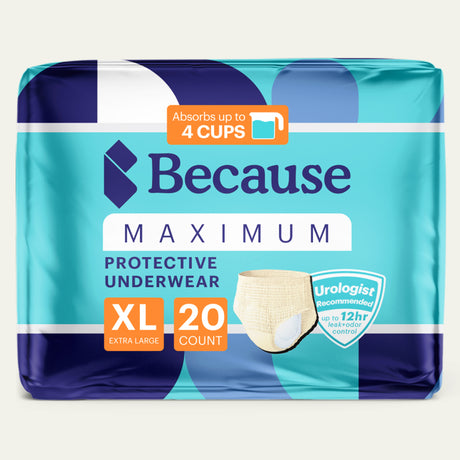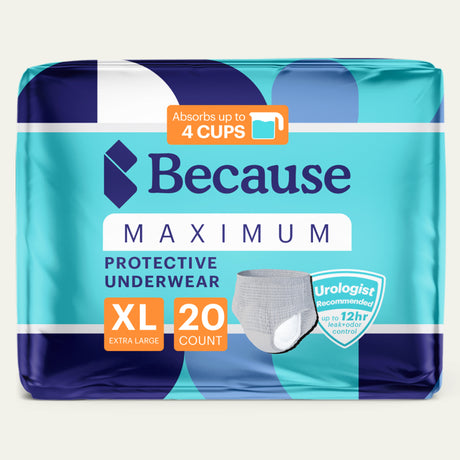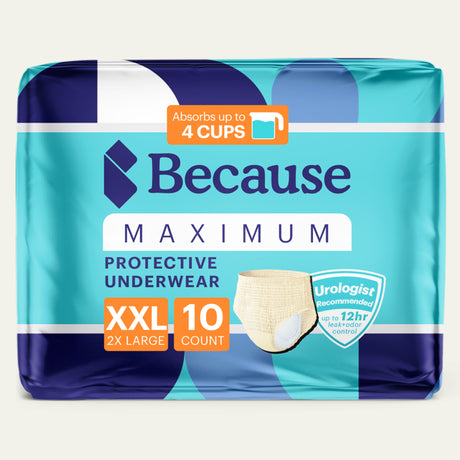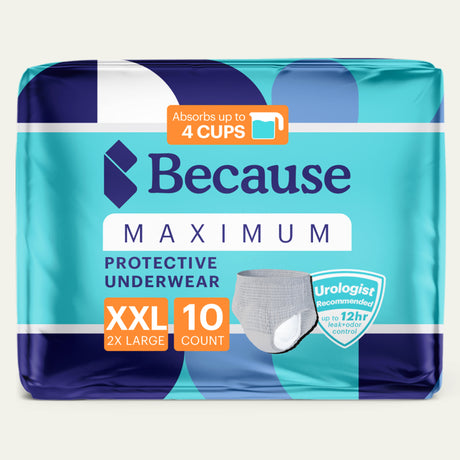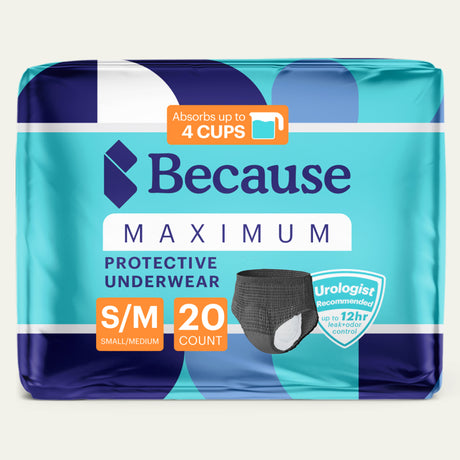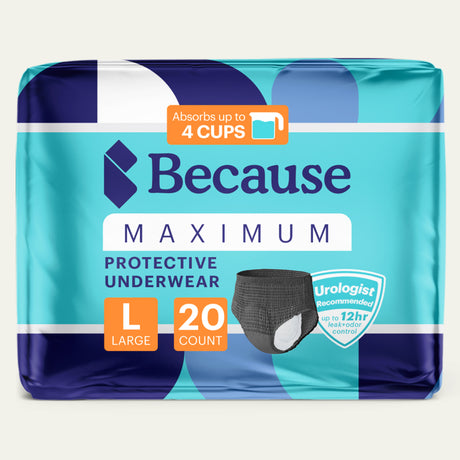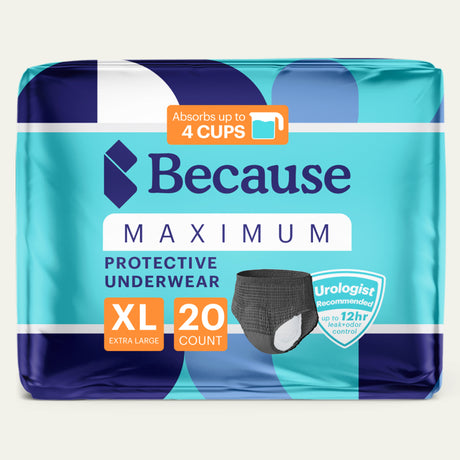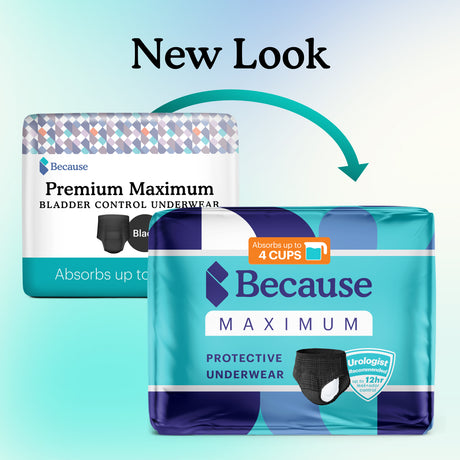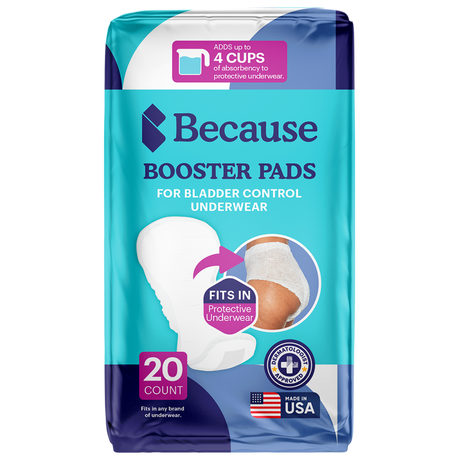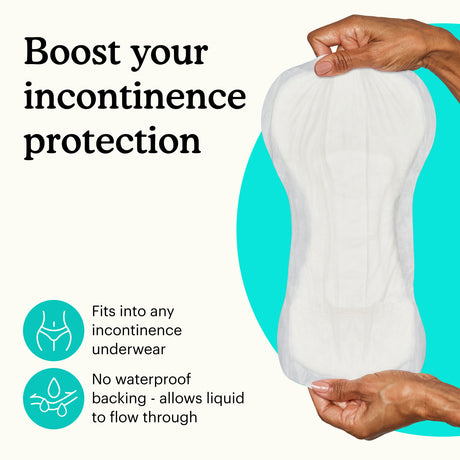Medically reviewed by Dr. Temitope Rude, MD
Caring for an older adult who struggles with nighttime incontinence and bedwetting, a form of incontinence known as nocturnal enuresis (NE), can be a challenge. As if dealing with elderly incontinence wasn’t enough, NE can bring added embarrassment and frustration, robbing aging adults of the dignity they deserve.
The first step in dealing with an issue is talking about it, and we’re here to help you give them the support and care they need to live confidently and comfortably! This guide will help you understand the many ways you can help your loved one with bed wetting, from having healthy conversations about nighttime incontinence, to proper skin care techniques and products to help them stay fresh and dry!
Is Elderly Bedwetting Common?
Bedwetting isn’t just something that young children deal with. Of the 33 million adults who live with urinary incontinence, five million also struggle with bedwetting. Bedwetting can occur at any age for a variety of reasons.
Common Causes of Elderly Bedwetting
There are a number of causes of elderly adult bedwetting—some neurological and some physical health conditions. Neurological disorders like dementia, Parkinson’s disease, and multiple sclerosis are linked with nocturnal enuresis, since these diseases impact the relationship between the brain and bladder. Other medical conditions and issues that can lead to bedwetting include:
- Diabetes
- Urinary tract infections (UTI)
- Overactive bladder
- Medication side effects
- Obstructive sleep apnea
- Enlarged prostate
- Prostate cancer
- Bladder cancer
- Urinary retention
- Sleep apnea
Elderly Bedwetting Solutions
As a caregiver, there are many ways you can help the older adult in your life with incontinence, especially if it occurs at night. Here are some of the best ways you can help!
Encourage Conversation
Despite how common incontinence is among older adults, there is still a damaging stigma around the issue that can cause those who deal with incontinence to feel alone, embarrassed, or unable to talk about it with others.
One of the best ways to help your loved one cope is by encouraging them to talk with you about incontinence or bed wetting. Having healthy conversations about incontinence can be difficult, so bring it up lovingly and only talk about it if they’re ready. If they don’t seem ready to talk to you about it, just let them know that you’re willing to listen and be there for them.
Choose the Right Bladder Protection Products
There are so many products on the market that can help with incontinence and prevent leaks, day or night. Encouraging your loved one to use bladder protection underwear is a great first step. Because bladder protection products are constructed with a dual absorption core and reinforced side guards that prevent leaks, even when a person is lying down.
Specifically, Because overnight underwear for women or overnight underwear for men absorb up to six cups of liquid, helping your loved one stay fresh and dry longer! Some of the best nighttime incontinence products on the market, this underwear absorbs 37% more than leading brands. If your loved one does have an accident, any moisture is quickly wicked away from the body, and odors are locked in to keep them feeling fresh and dry all night long. (Need help with sizing? Check out our adult diaper size chart.)
If they need added protection, add boosters, which offer an additional four cups of protection when used in combination with bladder protection underwear. All of these overnight products will offer peace of mind and help your loved one get better sleep, without disruption or worry.
Protecting the Bed
While protective underwear is important when dealing with bedwetting, it’s also necessary to protect their mattress. If you just need protection directly under your loved one, try a waterproof disposable bed protector. Or, if you’d prefer a reusable option, we also offer flat washable bed protectors.

As an added bonus, you can bring these protectors wherever you go! They are great for adding an extra level of protection during long car rides, sitting on the couch, or even sitting on a chair, as they quickly absorb leaks or spills and add protection where you need it. To use these protectors, place them so the colored surface is against the surface you’re protecting.
If you feel that you need more substantial protection, look into waterproof mattress protectors, which can be placed under a fitted sheet to protect a mattress from moisture and stains. There are even some flat sheets and fitted sheets on the market that are made with waterproof materials.
Consider Hygiene and Skin Care
In addition to causing discomfort and interrupting sleep, bed wetting can lead to skin issues around the genitals, buttocks, hips, and perineum. That’s why practicing a proper skin care regimen is so important.
Adult diaper rashes are one of the most common skin issues connected with bedwetting. If the skin is exposed to urine for long periods of time, a rash can develop and cause the skin to soften and break down. This can be irritating and uncomfortable.
The best way to avoid adult diaper rash is by keeping the area clean and dry and the skin moisturized. After an accident or when changing, wash the genital area with a gentle cleanser or a soothing aloe-based moisturizing wipe. After the skin is dry, protect it from moisture and irritation with a zinc-based barrier cream. This is a great way to repair and protect the skin's barrier, relieve inflamed or damaged skin, and strengthen skin cells to prevent irritation. If they need additional moisturizing, wipe down with a soothing, ultra-thick moisturizing bathing cloth as your final step.
Controlling Odors
An unfortunate side effect of bedwetting is the odor of urine. But the right products can help control and eliminate incontinence odors. Proper disposal of soiled products is key. Don’t let wet protective underwear or sheets sit around. Rather than putting them in an open trash bin, dispose of incontinence products like underwear and disposable bed protectors with disposable bags that have a fresh lavender scent that masks odors. And be sure to take these bags out to your outdoor trash bin as soon as possible. For any washable items, throw them in the wash as soon as possible, and use the tips in this blog post to help eliminate odors. For furniture that’s soiled, try a stain and odor-removing spray. And, of course, be sure to properly cleanse skin after any accidents as well, using a gentle soap, wipes, or a cleansing spray.
Read Next: How often do you need to change an incontinent patient?
Tips to Reduce Elderly Bedwetting
While some nocturnal enuresis is totally involuntary and due to more serious issues, many people find success in reducing or eliminating bedwetting episodes with some lifestyle changes and behavioral treatments. While some of these changes take time and practice, the long-term benefit is fewer accidents and more confidence.
Monitor Diet and Fluid Intake
Proper hydration is very important, but a simple way to reduce the risk of bedwetting is cutting back on liquids in the late afternoon and evening. (You’ll just want to make sure your loved one is getting enough water earlier in the day to stay hydrated!) Caffeine and alcohol, as well as acidic and spicy foods, can irritate the bladder. Reducing or eliminating these irritants from your loved one’s diet can lead to improved outcomes.
Bedwetting Alarms
There are devices available that can detect moisture and trigger a vibrating or auditory alarm that will wake up the person who’s just had an accident. While initially this won’t help prevent the accident, it does get their body used to waking up immediately after or even during a bedwetting episode. Over time, this will train a person’s brain to wake up on the front end of an accident, or even right before an accident occurs when they have the urge to urinate, giving them enough time to make it to the bathroom.
Gentle Leg Elevation
Adding gentle leg elevation for an hour before bed can increase vascular return and urine production. This will allow your loved one to more easily urinate before bed leading to less instances of nighttime bedwetting. Compression stockings can also be beneficial in increasing vascular return. This tip is especially useful if your loved one experiences noticeable leg swelling by the end of the day.
Toileting Schedules and Prompted Voiding
Creating a nighttime bathroom schedule doesn’t help deal with the underlying causes of bedwetting, but it’s a practice that can help reduce occurrences. Prompted nighttime voiding is when a person sets an alarm at random times throughout the night and gets up to go to the bathroom when the alarm goes off. This helps empty the bladder in the middle of the night, ideally reducing or eliminating accidents. However, unless your loved one wants to keep a very specific schedule and continue waking up at night indefinitely, it’s important to change alarm times each night so that their body does not become used to using the bathroom at a specific time at night.
Ensure Easy Access to the Toilet
Some bedwetting accidents are a result of a person being too far away from the bathroom or not having a clear pathway to get to the bathroom, especially if they use a mobility aid. By ensuring the path to the bathroom is clear and well-lit, and that your loved one only has a short distance to get there, they may feel more confident getting out of bed to use the bathroom at night.
Other Lifestyle Changes
Aside from fluid and diet changes, one other physical lifestyle change that can make a big difference is incorporating exercise into a daily routine. Pelvic floor exercises, also known as Kegel exercises, can strengthen the pelvic floor muscles, which control the bladder muscles. Kegels are characterized by the contraction of the pelvic floor muscles. To perform Kegel exercises, simply contract these muscles by pretending to stop urine flow, hold this contraction for a few seconds, and then release. Repeat this exercise for two to three minutes, a few times each day. Here are five additional exercise tips to improve bladder control.
When to See the Doctor + Potential Treatment Options
If your loved one is experiencing frequent bedwetting episodes, it’s important to talk with their doctor. A doctor will be able to help you and them understand why they may be struggling with bed wetting and diagnose which form of incontinence they have. In addition, their doctor can tell you what may be causing this incontinence, and which treatments may be best to help. Since some bedwetting is caused by something more serious, like cancer or neurological diseases, it’s also important for them to be able to test and monitor what’s happening in your loved one’s body.
Your loved one should be prepared to share the frequency and times of their bedwetting episodes with their health care provider, as well as any other circumstances that may have led to an accident. In addition, they can expect to undergo a physical exam, neurological evaluation, and submit a urine sample which will be sent to a lab for a urinalysis and urine culture.
All of these steps will help identify or rule out serious health problems and help the doctor prepare thoughtful treatment options. They may suggest some of the lifestyle changes and behavioral treatments we mentioned above, but in certain situations, a doctor may also suggest medication, physical therapy, or minor surgical procedures to improve symptoms.
Does your loved one suffer from urinary incontinence? Get a free sample pack to try.
If you're struggling to care for a loved one with incontinence, join one of our private support groups today!
Women's Incontinence Support Group
Men's Incontinence Support Group

Dr. Temitope O. Rude is a Clinical Assistant Professor at Stanford Urology. Dr. Rude received her B.A. in Neurobiology at Harvard University, and her MD from Stanford University. She completed her urology residency at New York University, followed by a fellowship in Female Pelvic Medicine and Reconstructive Surgery (FPMRS) at USC in 2020. Her research focuses on improving patient-reported outcomes post-surgery for pelvic organ prolapse, alongside groundbreaking work in the medical and surgical management of neurogenic bladder and complex voiding dysfunction.
Source:
NAFC. (n.d.). Adult Bedwetting. National Association for Continence. https://www.nafc.org/adult-bedwetting
